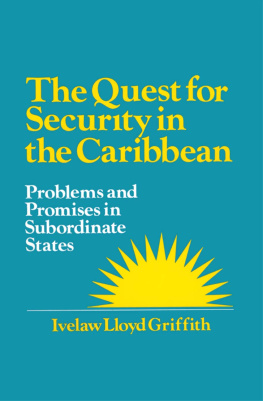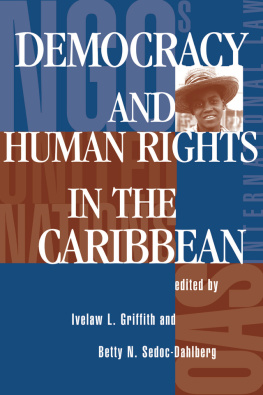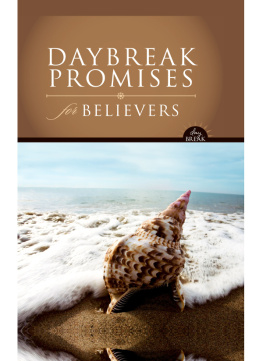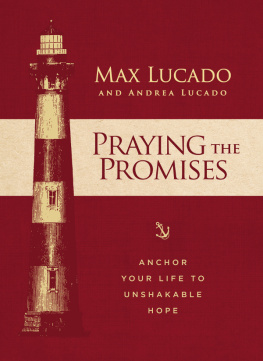The Quest for Security in the Caribbean
The Quest for Security in the Caribbean
Problems and Promises in Subordinate States
Ivelaw Lloyd Griffith
First published 1993 by M.E. Sharpe
Published 2015 by Routledge
2 Park Square, Milton Park, Abingdon, Oxon OX14 4RN
711 Third Avenue, New York, NY 10017, USA
Routledge is an imprint of the Taylor & Francis Group, an informa business
Copyright 1993 Taylor & Francis. All rights reserved.
No part of this book may be reprinted or reproduced or utilised in any form or by any electronic, mechanical, or other means, now known or hereafter invented, including photocopying and recording, or in any information storage or retrieval system, without permission in writing from the publishers.
Notices
No responsibility is assumed by the publisher for any injury and/or damage to persons or property as a matter of products liability, negligence or otherwise, or from any use of operation of any methods, products, instructions or ideas contained in the material herein.
Practitioners and researchers must always rely on their own experience and knowledge in evaluating and using any information, methods, compounds, or experiments described herein. In using such information or methods they should be mindful of their own safety and the safety of others, including parties for whom they have a professional responsibility.
Product or corporate names may be trademarks or registered trademarks, and are used only for identification and explanation without intent to infringe.
Library of Congress Cataloging-in-Publication Data
Griffith, Ivelaw L.
The quest for security in the Caribbean:
problems and promises in subordinate states / Ivelaw L. Griffith.
p. cm.
Includes bibliographical references and index.
ISBN 1-56324-089-0 (cloth)ISBN 1-56324-509-4 (pbk.)
1. Caribbean AreaNational security.
I. Title.
UA609.G751993
355.0330729dc20
92-31398
CIP
ISBN 13: 9781563245091 (pbk)
ISBN 13: 9781563240898 (hbk)
TO
Francille, my loving wife,
and to
Mothers who fathered me
Sybil Griffith, my natural mother
Lucy Roberts, my grandmother
Waveney Felix, my foster mother
Geraldine Thomas, my godmother
CONTENTS
Appendix 1
Memorandum of Understanding
Appendix 2
Military, Paramilitary, and Police Forces in the Caribbean. 294
Appendix 3
Acronyms and Abbreviations
A fall 1981 journalistic assignment took me across the equator, on a twenty-seven-hour round trip from Guyana to Melbourne, Australia, for the Commonwealth of Nations Heads of Government Meeting. My interest in small-state security problems dates from that conference, where the late Maurice Bishop of Grenada and leaders of other small states, including Fiji, Vanuatu, and the Seychelles, highlighted actual and potential threats to their countries and called for more collective safeguards.
Two years later there was the Grenada affair, a series of events involving factional disputes within the Bishop government that culminated in United States intervention. The Grenada episode dramatized the need for greater attention to the internal and external security of small states. The Commonwealth leaders met shortly after the Grenada affair in New Delhi, India. They responded to this need by issuing the Goa Declaration on International Security. Later, in keeping with a mandate of the New Delhi meeting, an expert group was convened to study the security problems of small states in the Commonwealth of Nations. Its report was published in 1985 as Vulnerability: Small States in the Global Society. Since then, several small states, both in and out of the Commonwealth, have faced either new or continuing internal and external security problems. This book examines security dilemmas facing one region of small states, the Commonwealth Caribbean.
For reasons too numerous to explain here, research on Caribbean security is a very difficult proposition. Completion of this study is, therefore, partly attributable to the assistance of several people and institutions, only some of whom can be named here. Several people provided data sources, among them: Wilfred Elrington in Belize; Compton Hendy in Barbados; Peter Laurie, Theresa Marshall, Yvette Goddard, and Philo Best of the Barbados Foreign Ministry; Patrick Lewis, Ambassador of Antigua-Barbuda to the United States and the Organization of American States; Dion Phillips of the University of the Virgin Islands; Assistant Superintendent Stephen Roberts of the Royal Grenada Police Force; and Godfrey Springer in the Bahamas.
Thanks also to Puis Bannis of York College; Frank Campbell, former Caribbean Community and Common Market (CARICOM) Foreign Affairs Officer; Thelma Ferguson, Deputy Permanent Secretary, Bahamas Ministry of National Security; Volville Forsythe of the Caribbean Development Bank; Brigadier David Granger, former National Security Adviser to the President of Guyana; Jennifer Hackett of the CARICOM Secretariat; Hilary Harker of the Jamaican Mission to the United Nations; Sheila Hazelwood of the Guyana Mission to the United Nations; Anne Langhaug of the United States Agency for International Development (USAID); Patricia Phillips of the Trinidad and Tobago Mission to the United Nations; and Lt. Commander Peter Tomlin of the Regional Security System (RSS), who retired in 1992.
The Organization of American States (OAS) and the City University of New York (CUNY) Graduate School provided research support during 1987 and 1988. CUNY librarians Jean-Jacques Strayer, Marve Brooks, Olga Torres-Seda, and Jeanne Hodgson provided invaluable help with library material from near and far. Preparation of the manuscript was aided by a 1991 Shuster Fellowship from Lehman College and by support from the Bronx Institute and its Director, Donna Kirchheimer. Helpful comments on manuscript drafts were provided by Asher Arian, CUNY; Jacqueline Braveboy-Wagner, CUNY; Anthony Bryan, North-South Center, University of Miami; Neville Duncan, University of the West Indies, Barbados; Brigadier Granger; Howard Lentner, CUNY; Commander Tomlin; and Donald Zagoria, CUNY.
My students Erlene Ellis, Eric Holder, and Alvin Mitchell provided various forms of assistance. Wanda Hughes of Lehman College helped me prepare the Selected Bibliography. My wife, Francille, and Wanda assisted with the tables and figures. Francille also provided the kind of support and understanding during stints away from home and during the preparation of drafts without which I could never have completed this project with my sanity intact. Thanks to all of them. Shortcomings in this work are, however, entirely mine.
ILG
Far Rockaway, New York
October 1992
The Quest for Security in the Caribbean
















